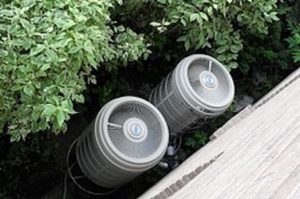Heat Pumps: Everything You Need to Know
The All-In-One HVAC Solution for Year Round Use

Few residential or commercial customers know that they have choices when it comes to heating and air conditioning equipment. Most assume an air conditioner and separate furnace are their only options. Yet, for moderate climates like ours, a heat pump can be a cost effective alternative to the standard HVAC systems with which you’re probably familiar.
First, what the heck is a heat pump, you may be wondering. It’s a system that can function both as an air conditioner in the summer and in the winter, as a heating mechanism on its own or as a useful accessory to your existing gas furnace.
When it’s hot outside, your heat pump takes heat inside the home and sends it to the outside. When it’s cold out, the pump works in reverse, gathering heat from the outdoors and bringing it inside your home. If the temperature outside is too low to extract any heat, your gas furnace (or an electric heater) assumes warming duties until outside conditions are again within a useful range for the heat pump to operate.
Either way, the heat pump is extremely energy efficient. Unlike a conventional furnace, they don’t run on fossil fuels. Whether you choose a split system (with an indoor and outdoor component), a variable refrigerant flow system, a packaged heat pump or rooftop unit, or a ductless/ducted heat pump, these products can be extremely practical in both residential and commercial HVAC settings.
With less energy usage, your utility bills will be reduced. But many people don’t realize that heat pumps also result in less maintenance and repair costs, too. After all, using a heat pump exclusively means you only have one piece of equipment to worry about, rather than a complicated system with plenty of moving parts. They’re easier to keep clean and keep running smoothly than more elaborate HVAC setups.
The catch? In some situations, your heat pump may cost more to install than more conventional systems. However, it’s definitely dependent upon the space for which it will be used, as well as your overall heating and cooling needs. Furthermore, new tax credits available for small business (as outlined in this white paper) can go a long way towards offsetting their installation costs.
You’ll also want to ensure your home or commercial building is already as energy efficient as possible, to maximize the utility of the heat pump itself. Adequate insulation, weather stripping, sealed ductwork and even programmable thermostats are a must when you’re considering installing a heat pump. Have more questions? Call us today to have a professional HVAC specialist keep you up to date on the options available, as well as help you ascertain which size is right for your particular location.
Have you thought about installing a heat pump for your home or commercial building? It might just be your perfect solution for energy savings all year round. Call us today to find out more! (626) 357-3535.
